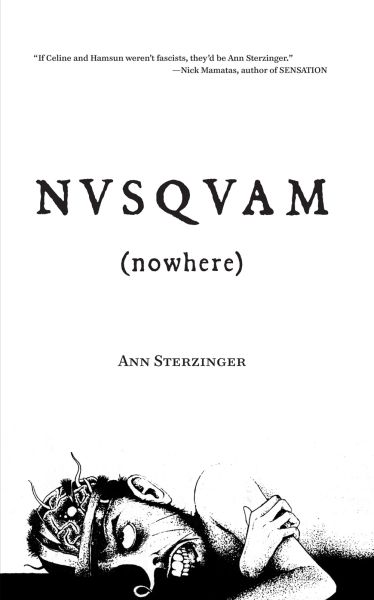It’s Latin to Me
NVSQVAM (nowhere)
By Ann Sterzinger

30 Jul, 2015
0 comments
Ann Sterzinger’s 2011 novel NVSQVAM (nowhere) establishes its protagonist Lester Reichartsen as a rather unlikable fellow on its very first page. If asked, Lester would doubtless explain that he’s prickly because he is suffering. Cue litany of woe: a decade ago he was kicked out of his band; he had to marry his pregnant girlfriend Evelyn (so self-centered that she refused an abortion!); he can’t stand the resulting kid; he isn’t keen on his faculty colleagues; he hates his thesis topic, the students he has to teach, and the southern Illinois town where he and his family live; he hates his dad; and he’s not fond of the family cat.
Lester’s dissatisfaction has been building for a decade but it all comes to a head in the fall of 2007, as events conspire to remind him of the glamorous life of a famous musician that he didn’t get to have (and as it happens, none of his former bandmates did, either). Miserable and self-pitying, Lester does what he can to share the unhappiness. Drowning his sorrows in booze inexplicably doesn’t help, almost as though alcohol were a depressant.
But there are a couple of hopeful notes:
The first is that the completion and defense of his thesis looms, promising escape from dissertation hell (albeit with the result that he will have a PhD in Classic Letters, a field that is less a job asset and more the punchline to a joke).
The other bright note is student/punk Cyndi Turpentine, who isn’t old enough to drink, but who does own a shirt from Lester’s old band and who is inexplicably interested in the (comparatively) ancient Lester in a way that is totally plausible and could happen to any middle-aged guy. There cannot be a hidden agenda on Cyndi’s part, who by the way happens to be a student of Evelyn’s; there most certainly couldn’t be consequences from which Lester’s life will never recover.
~oOo~
I’ve just come up with a new rule based on a very small set of books, which is that if a book features an affair between a middle-aged man and a much younger woman and the book is written by someone who is not themselves a middle-aged man, the book is unlikely to take a sympathetic view of the affair. Or the man.
In fact, I would be hard pressed to come up with any angle from which Lester appears sympathetic. He is unpleasant to everyone around him, in particular to his unfortunate son Martin; he’s not especially bright or observant; and he whines interminably about the miserable circumstances in which his own actions have landed him. Unfortunately, Lester isn’t the one who pays for his various transgressions — or if he does so, not to the degree that is justified by his behavior.
At least this is a third person narrative. Watching Lester from the outside is a bit like having to reach into an unplugged freezer full of rotten meat; hearing his version of facts directly would be even worse. Readers may be pleased to learn this is the sort of third person narrative that comes with snarky footnotes, which make for breaks from the depressing Lesterness of this book. Many of the footnotes take the form of asides about Brett Favre, Rumpole of the Bailey, The Young Ones, and other cultural icons [1].
Although the novel succeeds in painting Lester as a thoroughly despicable (although believable) character, there were other aspects of the novel that didn’t work as well for me. In particular, Martin never struck me as the eight year old he is supposed to be; he sounds less like a kid and more like a erudite high-schooler [2], or perhaps a university undergrad.
There’s also a bit of an odd disconnect between how Evelyn sees Lester’s affair and her perspective on the affair in which she herself had indulged. But that could be justified as one of those “I celebrate heartfelt romance, you are the slave of your dick, they are philandering bastards” declensions.
My characteristic understatement may have concealed how much I hated Lester. I don’t hate the book about him, because it’s never on his side. However, the book might have ended more satisfactorily if Lester had been torn apart by crazed undergraduate maenads in the last chapter.
NVSQVAM (nowhere) is available from Nine Banded Books.
1: There’s an … odd discussion of Frieda Kahlo that suggests she was comparatively obscure in the US (at least the bit of the US that is the stomping ground of the narrator) until recently,
Though I should add that I am somewhat unfamiliar with US regional cultural variations. I had no idea that Southern Illinois was like that, having never had a reason to consider the question.
2: Bear in mind I don’t have a particular problem with Marcus Elliot from Spies.
